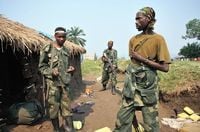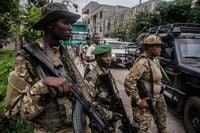The United Nations has sounded the alarm over what it describes as “horrific” atrocities committed by both the Democratic Republic of Congo’s armed forces and the Rwanda-backed M23 rebels in eastern Congo over the past year. In a report released on September 5, 2025, the UN Human Rights Office detailed a harrowing pattern of violence, including gang rape, sexual slavery, torture, summary executions, and the deliberate targeting of civilians. The findings, based on a fact-finding mission conducted between March and August, have raised the specter of war crimes and crimes against humanity, with both the DRC and Rwanda shouldering responsibility for the devastation.
For decades, eastern Congo has been a cauldron of violence, plagued by non-state armed groups and repeated cycles of conflict. But the escalation since late 2024, culminating in the M23’s seizure of Goma—the region’s largest city—in January 2025, has brought a new level of brutality. According to the UN report, the fighting has killed some 3,000 people and displaced at least seven million, creating one of the world’s most dire humanitarian crises. “The atrocities described in this report are horrific,” stated UN High Commissioner for Human Rights Volker Türk, as cited by Associated Press, adding, “It is heartbreaking and deeply frustrating to witness once again the dehumanization of the civilian population by those in power who are failing in their responsibilities.”
The report’s findings are stark. M23 rebels, an ethnic Tutsi-led armed group, have carried out summary executions, torture, detention, enforced disappearances, and forced recruitment—affecting thousands of civilians perceived as opposing the group or its authority. The violence has been particularly brutal toward women and girls. The UN investigators documented systematic sexual violence, including gang rape and sexual slavery, often perpetrated over prolonged periods. “Rapes were repeated over prolonged periods, often in conjunction with additional acts of physical and psychological torture and other ill-treatment, with a manifest intent to degrade, punish, and break the dignity of victims,” the report said.
But the abuses have not been limited to the rebels. Congo’s armed forces, known by the French acronym FARDC, and their affiliated pro-government militias such as Wazalendo, have also been implicated in grave violations. These include deliberate killings of civilians, widespread use of sexual violence—mainly rape and gang rape—and looting. The UN report noted that “perpetrators operated in large groups and in multiple localities simultaneously, in a manner that reflected recurring patterns of rape and looting, rather than isolated acts.”
Perhaps most damning is the report’s assessment of responsibility. The UN Human Rights Office concluded that the governments of both Congo and Rwanda bear direct responsibility for the ongoing abuses. “DRC and Rwanda bear responsibility for their support to armed groups with known track records of serious abuses, and for failing to meet their obligations to take all measures to ensure respect for international humanitarian law and to protect civilians from serious harm,” the report stated. M23, for its part, has received training, material, intelligence, and operational support from the Rwandan Defence Forces, with credible allegations even pointing to the covert presence of Rwandan personnel within the group. Rwanda, however, has repeatedly denied backing M23, claiming its forces act only in self-defense against the DRC’s army and ethnic Hutu militias linked to the 1994 genocide. M23 has also denied committing atrocities.
As the violence has spiraled, so too has the toll on the civilian population. A separate UN report in August 2025 found that healthcare providers in the eastern region had treated more than 17,000 victims of sexual violence from January to May 2024 alone. Schools and hospitals have not been spared; according to the UN Human Rights Office, soldiers and rebels have attacked these vital institutions, compounding the suffering of already vulnerable communities.
The UN report also highlighted the systematic nature of the abuses. The atrocities are not simply the actions of rogue elements but appear to be part of coordinated strategies by all sides. According to AFP, the report called for the establishment of a commission of inquiry to further investigate these allegations, underscoring the gravity and widespread nature of violations committed by all parties. “The findings underscore the gravity and widespread nature of violations and abuses committed by all parties to the conflict, including acts that may constitute war crimes and crimes against humanity,” the report concluded.
International efforts to halt the violence have so far fallen short. In June 2025, a peace deal mediated by the United States was signed, but the UN notes that it has not led to sufficient accountability for crimes or meaningful support for victims. In July, Qatar stepped in to mediate further, resulting in a declaration of principles signed on July 19, in which both sides pledged to negotiate a comprehensive peace deal in August. However, the deadline for reaching an agreement has come and gone, with no resolution in sight.
The UN Human Rights Council is expected to consider the report during its upcoming session, which opens on September 8, 2025. There is hope that international scrutiny may spur more decisive action, but for the millions affected by the conflict, relief still feels distant. The situation is complicated by the region’s tangled history: the eastern DRC’s borderlands have long been a flashpoint, with ethnic tensions, competition for mineral wealth, and the legacy of the Rwandan genocide all fueling instability. The M23, which claims to protect the interests of ethnic minorities in the mineral-rich region, first took up arms in 2012 before resurfacing in 2021. Since then, the group has made repeated gains across North and South Kivu, often with reports of support from Rwanda.
Human rights groups have repeatedly sounded the alarm about abuses in eastern Congo, but the latest UN report marks the first time a UN body has explicitly stated that these violations may constitute war crimes and crimes against humanity. A similar conclusion was reached by a UN panel of experts in June 2025, but the new report brings fresh urgency to calls for accountability. “The findings of this report drive home just how serious the situation is,” said UN spokesperson Ravina Shamdasani, emphasizing the “systematic” nature of rights violations and abuse.
For many in the region, the prospect of justice remains elusive. The UN report notes that both the DRC and Rwanda have failed to meet their obligations under international law to protect civilians and prevent abuses by armed groups under their influence. With peace negotiations stalled and violence continuing, the people of eastern Congo remain caught in a deadly stalemate, their suffering compounded by the world’s inaction.
As the UN Human Rights Council prepares to debate the findings, the international community faces a pivotal moment. The question now is whether the mounting evidence of atrocities will finally prompt concrete steps to protect civilians and hold perpetrators accountable—or whether, as so often before, the cycle of violence and impunity will simply continue.


